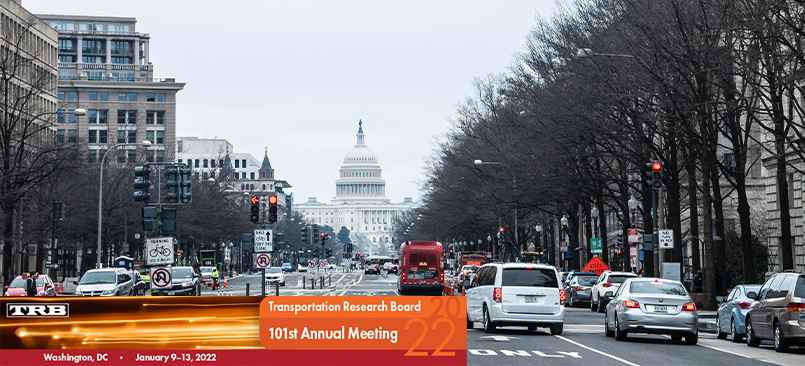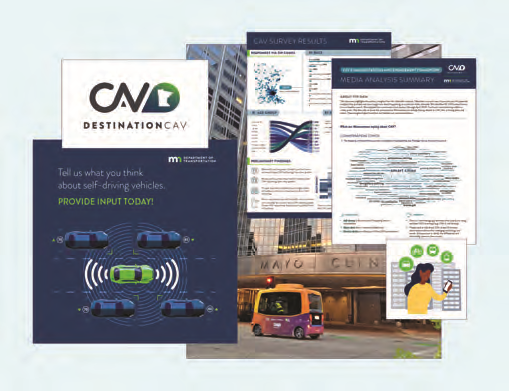TRB 2022 Annual Meeting: Through the Lens of the AJE40 Committee

Jeff Moore, AICP, is the chair of the Committee on Public Engagement and Communications with the Transportation Research Board. He has been active with the TRB since 2004. Jeff has also served as a planner with the Division of Planning at the Kentucky Transportation Cabinet, District Three Office, Kentucky for over 31 years. He is currently employed as a transportation planner for Michael Baker International.
As less than 9,000 attendees cautiously gathered into Washington this past week, we approached this year’s return to an actual in-person TRB Annual Meeting with an attitude of “Grace and Gratitude.”
As many of the committees, sessions, and workshops struggled with missing presenters and key committee members, COVID19 safety protocols and attempts to virtually reach out to those not able to attend, we approached each of these challenges with a sense of grace that best efforts were made and at times worked well, and other instances were at least brave attempts. At the end of the experience, we all were filled with a sense of gratitude for the opportunity to reconnect with long-missed friends and colleagues, the ability to share our lessons learned, and the realization that many of us are making it to the other side of the past two years’ worth of difficulties.
“Despite some sessions being canceled, it still turned out to be a great conference. It was great to see colleagues I haven’t seen in 2 years”
— Jamille A. Robbins, Public Involvement, Community Studies & Visualization Group Leader, N.C. Department of Transportation
Identifying the Goals of the 2022 TRB Executive Committee
With an eye toward the beginning of the second century of TRB and in response to the massive societal and economic shifts resulting from the past two years of difficulties, the TRB Executive Committee is commencing early work on the identification of the Critical Issues in Transportation.
This effort will focus on five broader societal goals:
- Safety and Security;
- Public Health;
- Economic and Societal Vitality;
- Climate Change; and,
- Equity.
Additionally, TRB is embarking on a new Strategic Plan. Goals for the plan include:
- Preparing to address current and future issues;
- Expanding TRB’s impact; and
- Assuring continued creativity, resilience, and sustainability.
Despite the lower attendance, the TRB 2022 Annual Meeting program contained 350 sessions and workshops and more than 300 committee meetings.
Activities of the AJE40 Committee at the TRB 2022 Annual Meeting
The AJE40 Committee provided a session spotlighting the winning and runner-up entries to the 15th Annual Communicating Concepts to “Jane and John Q. Public Competition”. Presenters at this session shared communication efforts in support of connected and autonomous vehicles, a re-imagining of an urban interstate highway corridor, a series of on-line chats in support of a MPO long-range transportation plan, and the creative melding of a local poet’s work into a video designed to inspire participation in the planning for a bus rapid transit line. The winner of this year’s competition was “Let’s Talk About CAV: Understanding Minnesotans’ Perspectives of Connected and Automated Vehicle Technologies” presented by Katie Caskey of HDR and Tara Olds of Minnesota DOT.
The AJE40 committee assembled a poster session that included several informative posters received during the call for posters and posters spotlighting the competition winner and the other five noteworthy projects featured in the “Jane and John Q. Public Competition” session.
- Competition Winner: Let’s Talk About CAV: Understanding Minnesotans’ Perspectives of Connected and Automated Vehicle Technologies; Katie Caskey, HDR and Tara Olds, Minnesota DOT
- Runner up: PAVE Virtual Panel Series; Tara Andringa, Partners for Automated Vehicle Education
- Runner up: Tuesday Traffic Jam; Corinne Tucker, Sarasota/Manatee Metropolitan Planning Organization
- Honorable Mention: Lowcountry Rapid Transit Video; Samantha Dubay, HDR and Sharon Hollis, Berkeley-Charleston-Dorchester Council of Governments
- Honorable Mention: Interstate 680 – Effective Communications Backed by Behavioral Science; Linsey Willis, Contra Costa Transportation Authority and Rebecca Krawiec, Convey, Inc.
To learn more about some of these projects, check out the Award Recipients highlights.
The committee partnered for this year’s annual meeting with AME60 (the Committee on Historic and Archeological Preservation in Transportation), AME80 (the Committee on Community Resources and Impacts), and AME10 (the Committee on Equity in Transportation) to produce an interactive workshop in which participants worked collaboratively in small groups to develop public engagement plans for two project scenarios that involved possible impacts to historic or archeological resources such as Native American burial sites, an established artist collaborative, and historic neighborhoods. Much effort went into the planning and execution of the workshop under the collaborative leadership of Michael Garua (Kimley-Horn) and Rusty Ennemoser (Florida DOT) from the AJE40 Committee and Linda Henderson (Texas DOT) and Rebekah Dobrasko (Texas DOT) from the AME60 Committee.
“The focus of the workshop was to learn from each other about the slice of public engagement each of us does in our daily work and create a roadmap for communicating with the public about our projects from planning through construction. The primary takeaway is that early outreach and communication is imperative to identify what’s important to the community so that solutions can be identified before the project schedule is impacted.”
—Session Co-Presenter Michael Garau, P.E., Kimley-Horn
In addition to the sessions and workshop, the committee was able to meet in-person with many of its members and friends.
Upcoming Work on Equity, Online Public Engagement Tools, and more
One of the major topics of discussion during the meeting of the AJE40 committee was the success of the Conference on Advancing Transportation Equity (CATE) which had been held in early September of 2021. The committee was one of the three key sponsoring committees for the conference and plans are underway to move toward on-going efforts to address the issue of equity and would include a regularly scheduled major conference event.
The agenda of the committee included reports from the committee task forces on Research and on Education. The Research Task force included updates on Project 08-142 Best Practices for Using Online Tools in Public Involvement Processes, which is currently underway with Rutgers University as the principal investigator and a targeted completion in the spring of 2024; and on the implementation of NCHRP Report 905: Measuring the Effectiveness of Public Involvement in Transportation Planning & Development. The 905 Implementation project is in progress with the DOTs of North Carolina, Georgia, Utah, Texas, and Arizona participating. A report will be compiled with the findings from the implementation of the tools developed as part of the NCHRP 905 project.
NCHRP 08-161: Identify Emerging Approaches for Public Engagement to Meaningfully Involve Minorities, Low-Income, and Other Vulnerable Populations is another committee-sponsored research project that is anticipated to be underway soon. Additionally, the AJE40 committee is currently collaborating with the Committee on Visualization in Transportation to propose a synthesis project to examine the current state of the practice of using visualization tools and techniques in public engagement and communications.
The committee’s task force on Education shared their work on the development of a possible public engagement curriculum module for university-level engineering and planning students. A survey was conducted of engineering and planning faculty to understand the need for educational resources on public involvement. One insight learned from the survey is that college professors and educators understand the need for students to learn about public engagement, and that there is a desire to use educational resources developed by others.
During the upcoming year, the task force will work to complete a Public Involvement 101 video presentation that could be used in engineering and planning courses. The video would focus on answering the following questions: What is public involvement; Why it is important; How it could affect your project; and What does public involvement look like. The task force also developed conceptual definitions of “engagement” and “communications” which have been incorporated into the forthcoming Triennial Strategic Plan for the Committee.
Additional information on the activities of the TRB AJE40 Standing Committee on Public Engagement and Communications can be found through the committee website.
